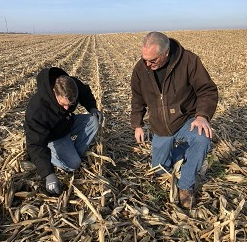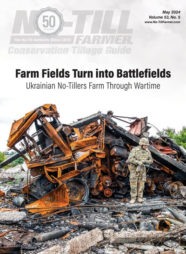No-tiller Les Seiler’s overarching goal for his Fayette, Ohio, farm is sustainable crop production to preserve and improve the land for future generations. After three decades of dedication to this goal, Seiler’s fellow growers and conservationists are honoring his work.
The American Soybean Association presented Seiler with the 2023 National Conservation Legacy Award during the annual ASA Awards Celebration event at the Commodity Classic farm show in Orlando in March. The Conservation Legacy Award is a national program designed to recognize the outstanding environmental and conservation achievements of soybean farmers, which in turn help produce more sustainable U.S. soybeans.
Seiler says he began focusing on soil preservation in 1986, when he and his brother set aside conventional tillage practices and looked to conservation farming methods on their Ohio farm.
Now, more than 30 years later, the Seilers continue to make no-till, grass waterways and filter strips, and planting cover crops routine components of their overall farm management plan.
“We have so much soil erosion because of poor soil health, and we can’t infiltrate water on the land anymore,” Seiler says. “We’ve seen the need to do something different besides conventional farming practices of moldboard plowing and a lot of tillage.”
Thinking outside the area’s traditional farming methods has proven beneficial to Seiler’s soil composition.
“Soils have changed dramatically over the years of using no-till and covers,” he says. “Infiltration rates have increased, erosion and runoff are reduced, and nutrient inputs, especially phosphorus and potash, have been drastically reduced or eliminated. Organic matter content on the soils has increased.”
Seiler’s conservation efforts have also helped reduce soil erosion and promote water absorption.
Waterways are used where needed in the Seiler operation. The practice involves 15-to-30-foot-wide buffer strips on all fields and along streams. The most visible is what Seiler calls a “massive two-stage ditch in one of their major drainage channels.” The venture was a cooperative effort with The Nature Conservancy.
Seiler Farms is part of the Western Lake Erie Basin, where he says farming practices need to be improved to help mitigate losses. Seiler says the Maumee River is one of the biggest contributors to the algal bloom issues of Lake Erie.
He recalls the Toledo water crisis of 2014, in which several people had no access to water for two days because of the algal blooms. Seiler realized during this situation that he didn’t want to be a contributing factor to anyone going without water.
“I don’t think there should be anybody anywhere in the world who wonders where their next glass of water is coming from, or if water is going to be an issue,” Seiler says. “I hope someday that somebody says, ‘That guy made a difference.’ I don’t want to be the one who didn’t realize the importance of that.”
Related Content:
No Stone Unturned in Quest for Healthy Soils







Post a comment
Report Abusive Comment